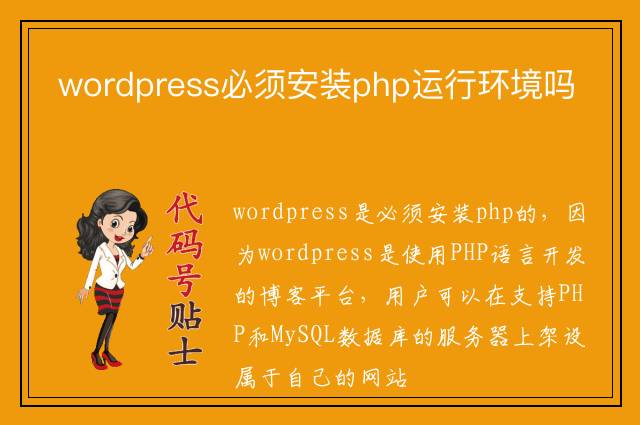您现在的位置是:首页 > cms教程 > WordPress教程WordPress教程
WordPress设置Description、Keywords和Title的方法
![]() 钟召云2025-03-20 14:23:15WordPress教程已有12人查阅
钟召云2025-03-20 14:23:15WordPress教程已有12人查阅
导读且看之前的两篇文章,关于SEO WP博客的Description、Keywords和Title。(有什么不明白的话也可看这两篇文章,有详细的分析。)分享SEO WordPress的Description 与 Keywords
且看之前的两篇文章,关于SEO WP博客的Description、Keywords和Title。(有什么不明白的话也可看这两篇文章,有详细的分析。)
分享SEO WordPress的Description 与 Keywords
分享SEO WordPress的标题Title
最近又挺多童鞋过来问要关于Page页面和分类页面的Description和Keywords。研究了一下,终于通了。完整版诞生。功能可与All in One SEO 插件相媲美。这下你们是可以彻底丢掉All in One SEO 插件了。
推荐的修改方法:
在header.php,原始的title是这样的: 修改为: 你只要把下面的代码保存在desc.php就OK了。(如果有中文的话,记得另存为文件的编码是UTF-8。切记)。把desc.php上传到你的主题的目录下。
SEO WordPress的Description、Keywords和Title(通用版)
Title是覆盖所有的页面的了。通用版的Description和Keywords就只有首页和文章页面的。
把下面的代码另存为desc.php就行了。细节问题自行改动。 加入Page页面和分类页的的Description和Keywords。强大!!!!首先当然要知道各个分类页面和Page页面的ID了。 ~完。
分享SEO WordPress的Description 与 Keywords
分享SEO WordPress的标题Title
最近又挺多童鞋过来问要关于Page页面和分类页面的Description和Keywords。研究了一下,终于通了。完整版诞生。功能可与All in One SEO 插件相媲美。这下你们是可以彻底丢掉All in One SEO 插件了。
推荐的修改方法:
在header.php,原始的title是这样的: 修改为: 你只要把下面的代码保存在desc.php就OK了。(如果有中文的话,记得另存为文件的编码是UTF-8。切记)。把desc.php上传到你的主题的目录下。
SEO WordPress的Description、Keywords和Title(通用版)
Title是覆盖所有的页面的了。通用版的Description和Keywords就只有首页和文章页面的。
把下面的代码另存为desc.php就行了。细节问题自行改动。 加入Page页面和分类页的的Description和Keywords。强大!!!!首先当然要知道各个分类页面和Page页面的ID了。 ~完。
本文标签:
很赞哦! (1)
| 暂无内容 |
| 暂无内容 |
相关文章
- 易优CMS标签lang_title当前语言用法示例
- PbootCMS去除UEditor编辑器图片自动添加的title和alt属性的方法
- PbootCMS执行SQL错误:duplicate column name: picstitle的解决
- WordPress标题函数wp_title()使用方法介绍
- ecshop商品详情页增加自定义TITLE的方法
- ecshop自定义title标题的步骤方法
- ecshop的title标签优化方法
- ecshop筛选属性修改title标题的实现方法
- 升级pbootcms执行SQL发生错误duplicate column name: picstitle
- pbootcms升级提示执行SQL发生错误!错误:duplicate column name: picstitle
- 织梦dedecms修改TAG的title字数限制的方法
- dede织梦图片alt标签自动调用title的方法
| 暂无内容 |
| 暂无内容 |
随机图文

wordpress函数get_option()的使用方法介绍
如果你想开发自己的一个wordpress插件,那么也许你有些数据希望保存,这些自定义数据一起都保存在 wordpress数据库的wp_options表,wp_options表就像一个大抽屉,你的wordpress
wordpress主题删除的方法有哪些
在使用Wordpress搭建网站时,非常方便的一点就是你可以随时更换你的主题,让网站成为另一种风格,但是因为Wordpress只能使用一款主题
wordpress必须安装php运行环境吗
wordpress是必须安装php的,因为wordpress是使用PHP语言开发的博客平台,用户可以在支持PHP和MySQL数据库的服务器上架设属于自己的网站
docker搭建wordpress博客的实现方法
环境:centos7、docker、vmwareworkstation虚拟机1 拉取mysql:5.7 镜像,使用mysql镜像运行一容器2 运行容器 查看状态3 拉取wordpress镜像4 运行wordpress 容器,查看状态
| 留言与评论 (共有 0 条评论) |








